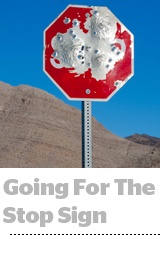 A year ago, the rise of ad blockers put the online advertising ecosystem into an existential crisis.
A year ago, the rise of ad blockers put the online advertising ecosystem into an existential crisis.
But not only did the ‘adpocalypse’ never materialize, many of the same stakeholders who were on the defensive now see a chance to reclaim lost ground.
“People were literally saying this is the death of the web, and if you look at the data today, mobile ad blocking didn’t happen and there’s a complete unacknowledged plateauing of ad blocking in the US,” said Eric Franchi, co-founder and senior VP of business development at Undertone.
But Jason Kint, CEO of the trade association Digital Content Next, says ad blocking is still a long-term threat to the industry: “The flattening numbers are a red herring due to the consumption shift to mobile, where ad blocking has very little penetration.”
The contradictory points of view are really flip sides of the same coin. Even as ad blockers arrived in Apple’s App Store and Google’s Play Store, mobile ad blocking (in the US, at least) hasn’t become a real threat.
But Adblock Plus (ABP), the world’s most popular ad blocker and founder of the Acceptable Ads whitelisting program, which is the primary revenue source for the whole ad blocker ecosystem, sees the lack of mobile ad blocking as a growth opportunity.
“For us, yes, some markets have plateaued a bit,” acknowledged Till Faida, CEO of ABP. “But we see high adoption rates, especially with young people, and as young people switch to mobile, that’s going to be our biggest product focus.”
Kint said digital media companies shouldn’t underestimate the potential for mobile adoption, given the compelling value proposition for blocking smartphone ads: data charges, more control over privacy and a superior user experience.
“There are encouraging trends, depending on what country you’re looking at, but you have to take into consideration that this is happening alongside a continual shift to mobile,” he said. “It’s a window of opportunity for the industry and shouldn’t be seen as anything other than that.”
The ad industry has also come to terms with ad blocking’s existence and role.
The IAB and publishers in Europe initially responded to ad blockers with cries of extortion and threats of legal action (and in fact, German publishers have brought ABP to court six times). Despite German publishing giant Axel Springer’s barrage of legal action, “the debate is much less emotional now because people have accepted the fact and legitimacy of ad blocking on browsers and phones,” Faida said.
Another reason why ad blocking didn’t change the industry: Many companies supplying the technology either failed or struggled to drive revenue.
Network-level ad blocking, a niche carved out by an Israeli startup, Shine, gave the industry a good scare but has since fizzled. One source with knowledge of Google’s anti-ad blocker strategy said network-level blocking was theoretically a more serious threat than ad block apps or browser extensions, but that its lack of users and daunting regulatory hurdles in Europe and the US make it a functional nonconcern.
ABP has also struggled to develop revenue streams beyond its Acceptable Ads whitelist. ABP announced a service in May called Flattr Plus, designed to distribute monthly fees to each user’s most visited sites. It’s also working on a supply-side platform (SSP). But neither Flattr Plus nor the ABP SSP have emerged from beta, and the SSP was undercut by its would-be demand sources AppNexus and Google AdX, which immediately suspended ABP’s buyer seat on their exchanges.
ABP’s opponents see its reliance on whitelisting revenue as a potential vulnerability. There are only 70 or so companies paying whitelisting fees, and sources have told AdExchanger that Google alone accounts for a significant chunk of that revenue.
Faida said Eyeo GmbH (the software parent company of ABP) would remain profitable if any single partner abandoned whitelisting. “I’m not worried because it provides value to all our partners, and all our partners make more money because of it at the end of the day,” he said.
Kint called out Google specifically for underwriting much of ABP’s revenue – essentially funding products that undermine the ad industry. Other whitelisting contributors like Criteo and Taboola must also reconcile their incremental revenue gains from the Acceptable Ads program and the displeasure they incur from the media industry and trade groups.
Franchi said the IAB, where he’s a board member, responded to the critiques of ad blockers with open-source initiatives like LEAN and DEAL, which provide best practices and tools for publishers to lighten their ad loads or establish direct advertising value exchanges with readers in return for content. He attributed those collaborative efforts to a change in ABP’s tone since last year, during which it tried to develop a proper business, rather than serving as a protest movement for irritable consumers.
But this evolution also positions ABP as just another media/tech player in the supply chain. Instead of an idealistic movement, it’s now a much more conventional company – one its adversaries know how to compete against.
“Welcome to the jungle,” Franchi mused.
This post was syndicated from Ad Exchanger.

More Stories
How The Sports Bra Sold Its Game Plan to the World
The Trade Desk’s OpenPass Adds Rewards As It Pursues Wider Adoption
NZME’s work recognised at INMA Global Media Awards